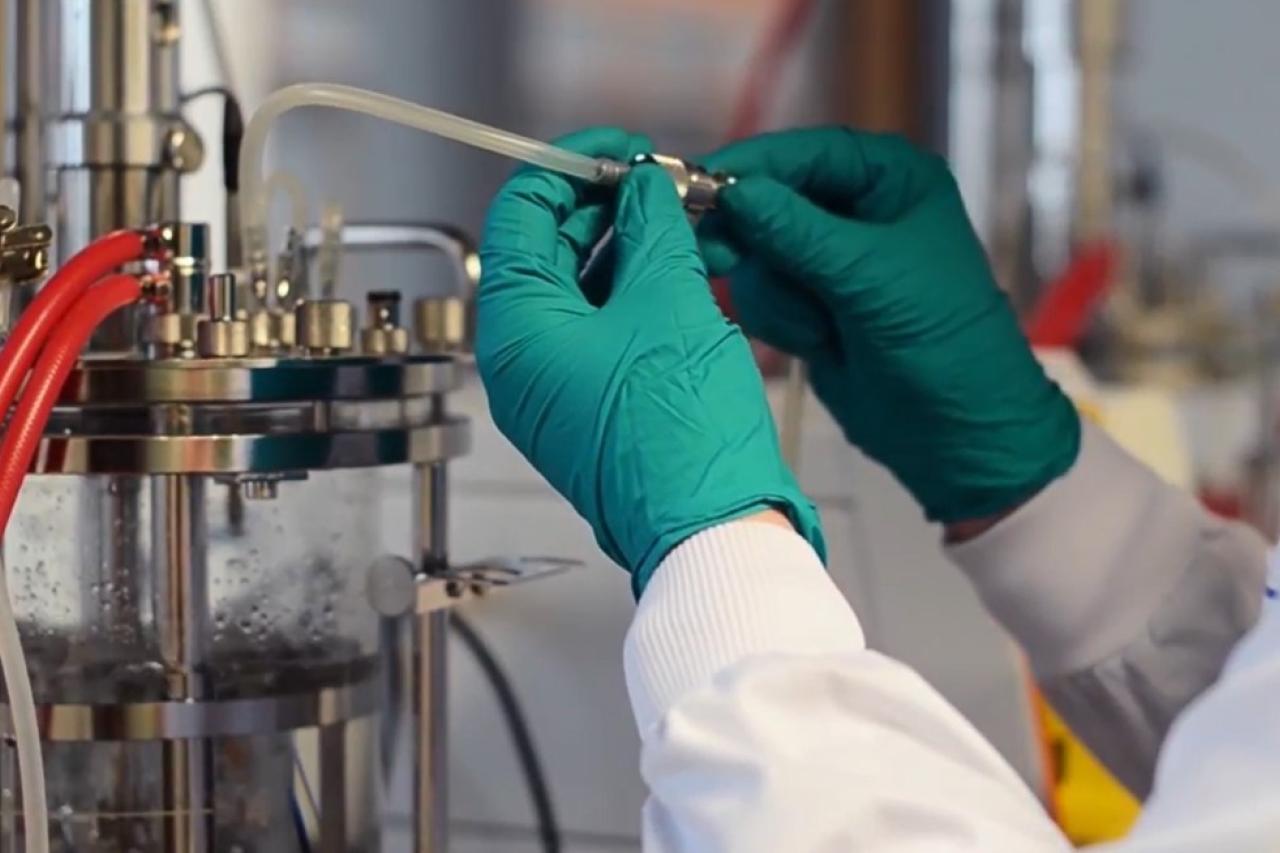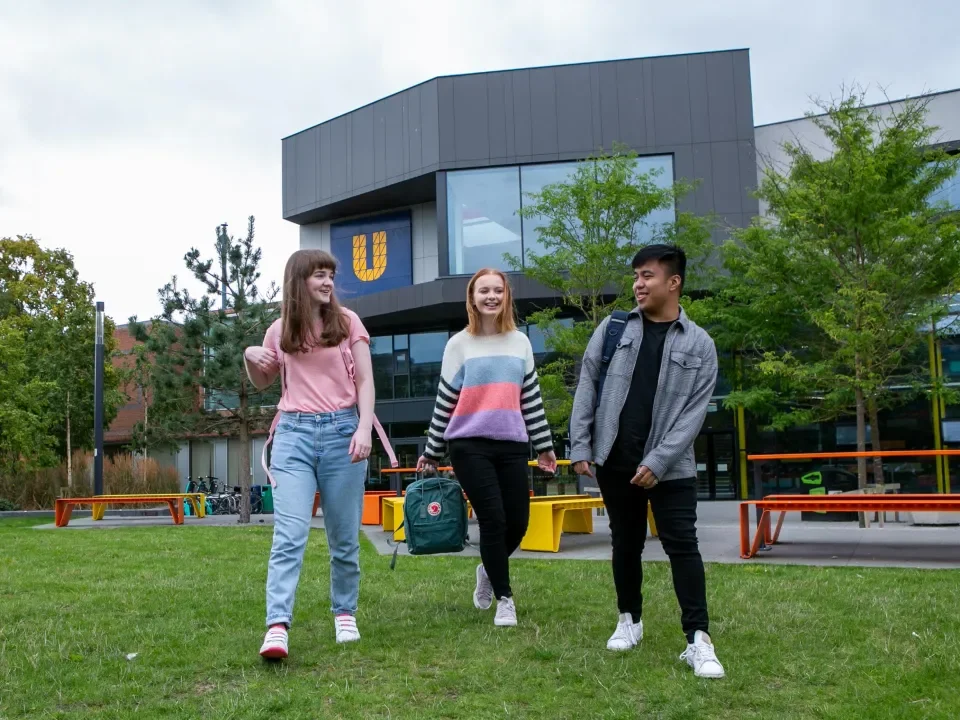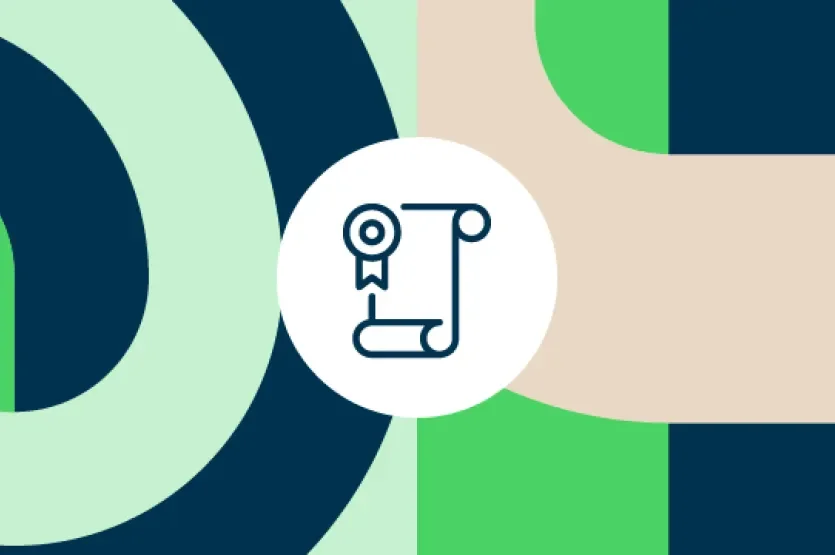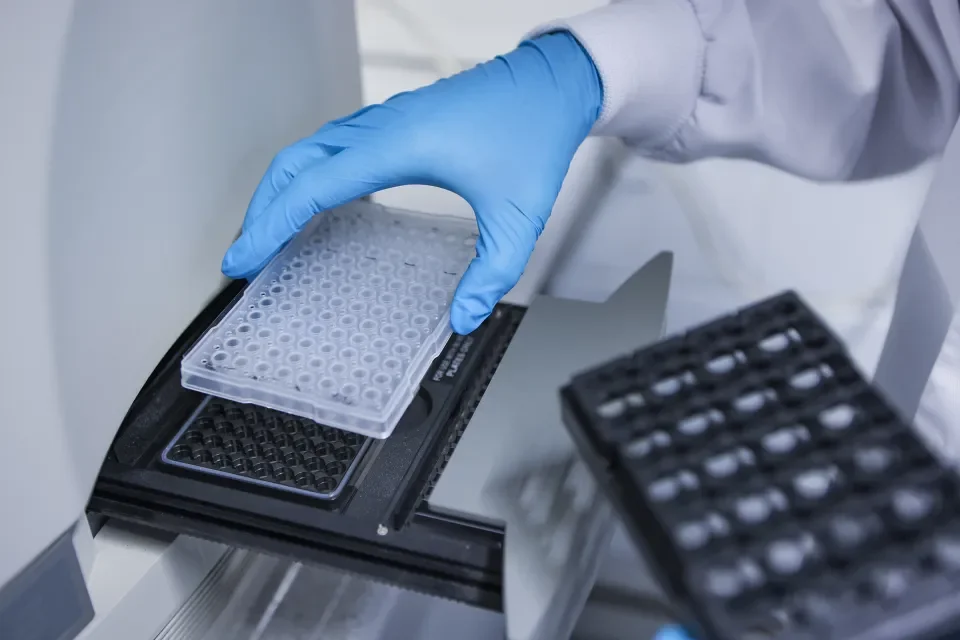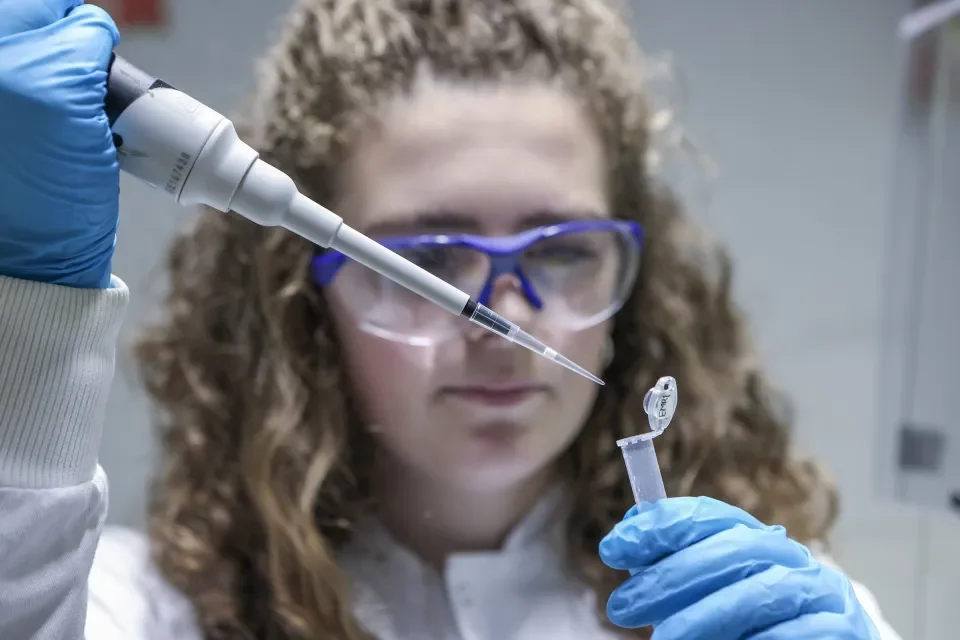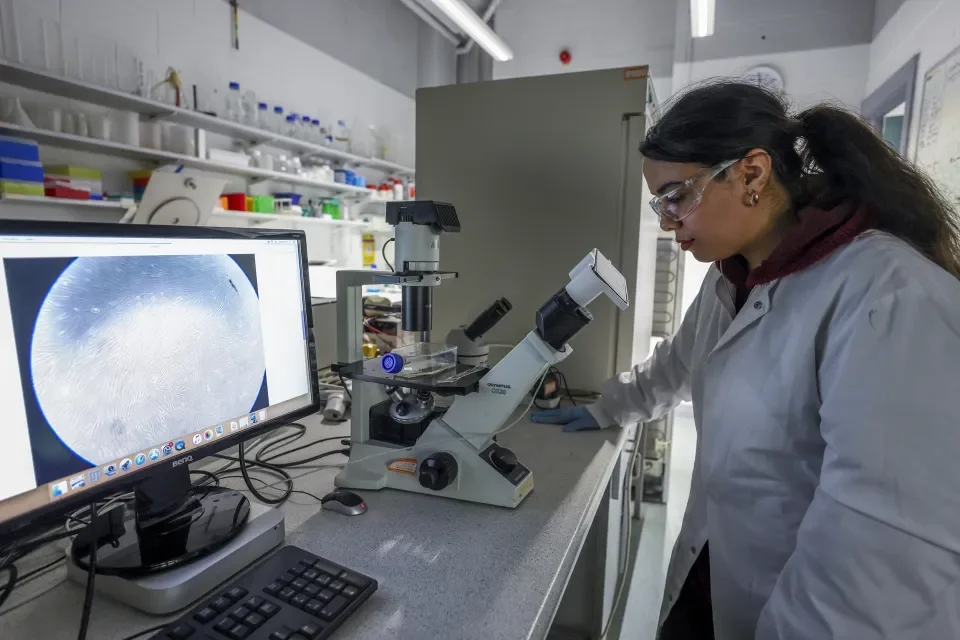Overview
Bioprocessing could be the right path for you. It involves applying biological sciences and bioprocess engineering principles to the manufacturing of pharmaceuticals, enzymes, food and other products, on a commercial scale.
On this course, you’ll come to understand the fundamental biological principles and methods involved in developing new drugs and other products. You’ll also learn about the challenges of large-scale manufacturing, and develop the bioprocess and biomolecular engineering knowledge and skills to solve those problems.
Future-proof your career
The BSc in Bioprocessing is a DCU Futures course, meaning it has been designed to reflect real-world needs and give you a diverse suite of skills. You’ll move from studying the basic sciences, mathematics and data analytics, to delving more deeply into biology and bioprocessing, and tackling real-world bioprocessing problems. In third year, you’ll get to do a nine-month INTRA work placement.
Graduates can work as bioprocessing specialists in the biopharmaceutical, food, beverage, industrial enzyme, and microbial biotechnology sectors. With their in-depth knowledge of data analytics, process analytical technologies, and process automation and control, they can also thrive in other sectors, including fine chemical processing, environmental management, and sustainability.
Why DCU
DCU People
Careers & Further Options
Careers
Acquisition of knowledge and development of skills in data analytics, process analytical technologies, and process automation and control will ensure you are fully equipped to address the processing challenges that arise across bio- and non-bio sectors. There is a huge demand for graduates with these skills in career areas such as
- Biopharma
- Food and Beverage Industry
- Industrial Enzymology
- Microbial Biotechnology
- Chemical Processing
- Environmental Management
- Sustainability Sectors
DCU graduates are highly sought after by employers. Our Graduates work in environments ranging from large multinationals to SMEs, family businesses and start-ups across every sector.
DCU Careers Service has a number of learning and development initiatives in place for our students, giving them the skills they need for a successful career path.
Entry Requirements
Entry is via Biology Sciences General Entry - and list the requirements for that programme, Biological Sciences General Entry | School of Biotechnology | Dublin City University (dcu.ie)
Entry is via Biology Sciences General Entry - and list the requirements for that programme, Biological Sciences General Entry | School of Biotechnology | Dublin City University (dcu.ie)
Entry is via Biology Sciences General Entry - and list the requirements for that programme, Biological Sciences General Entry | School of Biotechnology | Dublin City University (dcu.ie)
Applicants that have completed at least one year of study at NFQ Level 6, 7 or 8 at another institution may apply to continue their studies on a similar programme at DCU. There should be substantial overlap in content between the two programmes to be considered for a transfer. Results and other supporting documentation must be submitted to CAO by the closing date of 1st July. This is a competitive application process for a small quota of advanced entry places. Offers are made on a rolling basis until all places are filled. Early application is advised. Please note: Applicants should also consider applying through the appropriate route for first year entry to the programme they are interested in. This application process is only for advanced entry.
International candidates are expected to have educational qualifications of a standard equivalent to those outlined above. In addition, where such candidates are non-native speakers of the English language they must satisfy the university of their competency in the English language. For further information on international applications click here .
Course Structure
You will enter BSc in Bioprocessing via the Biological Sciences General Entry route (DC180), confirming your choice at the end of Year 1.
At the start of the BSc in Bioprocessing, you will be introduced to the basic sciences, mathematics and data analytics. As you progress, you will delve more deeply into the fundamentals of both biology and bioprocess engineering, putting in place the foundations to be able to integrate these disciplines.
In Year 3, you will begin to focus on real-world bioprocessing problems and have the opportunity to spend nine months in industry as part of our industrial training programme (INTRA).
In Year 4, you will continue to develop your ability to integrate biology and bioprocess engineering. You will complete an industry-focused research project and take part in a team-based product innovation challenge. You will also contribute to a research-focused journal club with your fellow students and your lecturers.
Fees and Funding
Fees
How To Apply
Advance Entry Applicants only. Applications are made via the CAO Advanced Entry route which will open on the 06th November to the 01st July.
Please see Application Procedures or E-mail ugadmissions@dcu.ie.
Life On Campus
At DCU, our students can expect a unique campus experience. We are known for our excellent teaching and learning facilities, our active clubs and societies, and our great social and sporting facilities. All this makes DCU an exciting place to be.
DCU has three academic campuses; Glasnevin, St. Patrick’s and All Hallows (both in Drumcondra), all close to Dublin City centre.
They can be reached by public transport, Dublin Bus and Bus Éireann, with our Drumcondra campuses a ten minute walk from Drumcondra Train Station. Glasnevin is a 20 minute walk from St Patrick’s and All Hallows. They are also linked by Dublin Bus.
Each campus has a library (O’Reilly, Cregan and Woodlock Hall), study spaces, restaurants, and on-campus residencies. There are sports facilities on Glasnevin and St. Patrick’s, and there is a dedicated sports campus, St Claire’s, located near Glasnevin on the Ballymun Road.
DCU’s 19,000 students have access to exceptional teaching and learning facilities across our three academic campuses.
These include modern learning theatres, research centres, a new media and TV studio, radio/podcast studios, computer suites and advanced labs in the areas of Languages, Engineering, Physics, Chemistry and Biotechnology, as well as a Sports Performance centre and a training hospital ward. In 2021, we opened our first virtual reality ‘Leadership Lab’, which is located in our Business School.
We continue to improve and update our facilities. For example, construction of a new world-class STEM facility is underway on the Glasnevin campus. With capacity for an extra 3,000 STEM students, this facility will advance DCU’s international reputation for excellence in science and health, computing and engineering disciplines.
Studying in DCU isn’t just about course work. The university is rich in student life and activities.
There are more than 140 clubs and societies for students in DCU, with ‘Clubs & Socs’ days taking place on both the Glasnevin and Drumcondra campuses at the start of the academic year. They span everything from rugby to rock climbing, anime to jazz.
For many students, sport is an important part of the DCU experience. DCU’s Sports Complex boasts a 25 metre swimming pool, fitness centre gym, all-weather pitches and squash courts, as well as soccer, GAA and rugby pitches. DCU Dóchas Éireann, the university’s GAA club, is the largest third level Gaelic Games club in the country. Meanwhile, DCU Athletics has been Ireland’s highest achieving university club for many years. And DCU has dozens of other clubs to get involved in, from Archery to Weightlifting.
The Glasnevin campus is home to our purpose built, state-of-the-art student centre, The U, which serves the needs of a rapidly growing student body. Here, you will find the Student Leadership and Lifeskills Centre, performing arts and cultural spaces for students and the wider community, and the Entrepreneurship and Innovation Hub. Also located on our Glasnevin campus is The Helix, our renowned performing arts centre.
On our St Patrick’s campus, we have the Java Student Hub, a vibrant, warm and welcoming space where students can meet for coffee, play music, use the projector to watch events, or just relax. The walls of the Java Hub were designed based on the cultural history of St Patrick’s Campus, including the special references to the notable sporting history and history of the arts.
We have a number of academic, professional and social supports for students.
Student Advice & Learning Skills Centre - Offers a wide range of supports and services to students and advice
The Writing Centre - drop-in writing workshops for students through the academic year
Maths Learning Centre - provides maths support for students of all ability levels with maths modules
Student Learning - facilitate the transition from passive to active learning for students at DCU, by teaching study skills, nurturing critical thinking and building student confidence.
Careers work with students to help them on their professional journey into graduate employment.
Our student support team offers a comprehensive support programme, helping students make that all important transition into university life and focusing on building confidence and skills which are key to success at third level.

DCU Glasnevin Campus
FAQs
Is DCU all one campus?
DCU is a multi campus university - the Glasnevin, St Patrick's and All Hallows campuses. The St Patrick's campus is where the Education courses are taught and some of the subjects from the BA Joint Honours degree. There is a 20-25 minute walk between the campuses but there are buses and bikes available to go between them also.
Click here to see maps of all of our campuses
If I'm studying on the St Patrick's campus, can I use the library and sports centre on the Glasnevin campus?
Yes, all facilities such as sports and accommodation are open for all DCU students to avail of.
Are there libraries in DCU and if they have wifi and work stations?
We have a brand new state of the art four floor library on our St. Patrick's Campus which complements the existing library on the Glasnevin campus. There is free wifi, work stations as well as desktop computers.
Does DCU provide accommodation?
DCU does have on-campus accommodation for undergraduate and postgraduate students, and you can find out more and apply via the Accommodation Office webpage.

